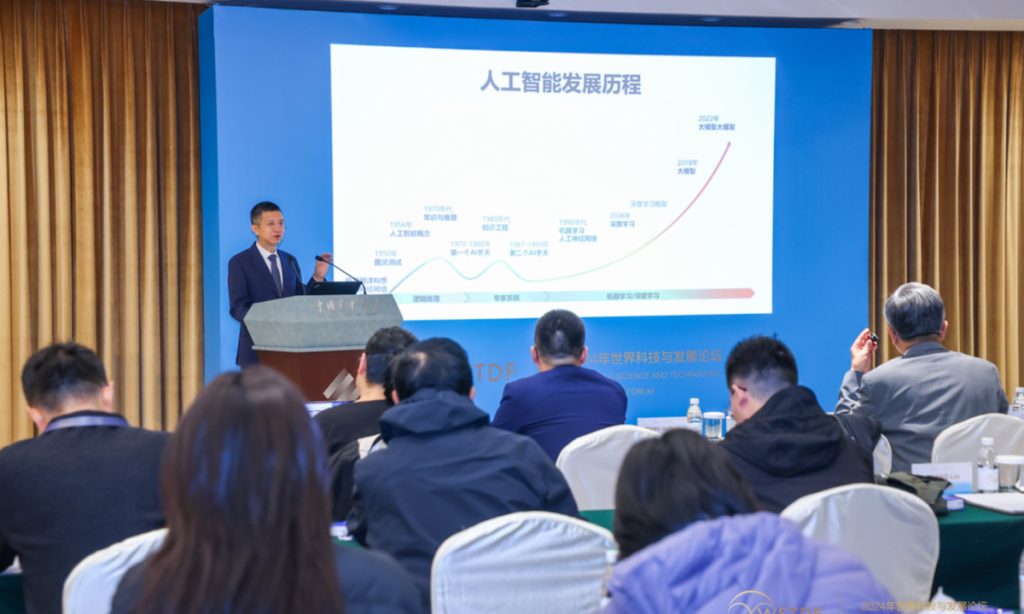Scientists, entrepreneurs from China and abroad discuss trends, challenges in AI industry at key forum in Beijing

Chinese and foreign scientists and entrepreneurs held lively discussions regarding technology trends in the development of the artificial intelligence (AI) industry during the 2024 World Science and Technology Development Forum (WSTDF), which held from October 22 to 24 in Beijing. They called for international cooperation to take full advantage of benefits from the development of the AI industry while enhancing global governance on AI development.
Qiao Hong, an academician at the Chinese Academy of Sciences and director of the State Key Laboratory of Multimodal Artificial Intelligence Systems, highlighted 10 trends in the AI industry at a thematic session titled AI Governance Innovation: Building an International Trust Foundation for Cultivating the Ecology of Science and Technology Governance (INTELLIGENCE), during the WSTDF on Wednesday.
AI has become an important driving force in today's technological revolution. It is changing our ways of living and working at an unprecedented speed. From smart manufacturing, smart cities, and healthcare, to financial services, the applications of AI are essentially ubiquitous, with a profound and extensive impact. The subsequent question we face is, in which direction will AI develop? Qiao said at the session.
The first trend outlined by Qiao is small data and high-quality data.
The importance of data to AI cannot be overstated. If the data is toxic, it will fail to lead to a stable result; if the data is too big, it will consume too much in terms of computing resources; not to mention the privacy leakage risk related to data, Qiao stressed.
"In this context, how can we reduce the use of data, ensure its quality, and minimize its impact on people's lives? These have all become very core issues," Qiao said.
Other trends and AI-related challenges Qiao mentioned include embodied AI and generative AI. "As a whole, the development of AI is advancing technological and social transformation at an unprecedented pace. We see limitless possibilities and potential in cutting-edge fields such as AI, large models, embodied intelligence, and generative AI. These advancements bring us greater convenience and a more efficient life, drive our innovation and development, and inspire us with bigger dreams. Let us look forward together to a future filled with opportunities and challenges," Qiao concluded.
At the thematic session on AI, Wang Haifeng, Chief Technology Officer of Baidu and head of the National Engineering Research Center of Deep Learning Technology and Application, also shared his insights into the trends and developments of AI technologies and industry.
Wang believes that large models bring hope for Artificial General Intelligence (AGI) in terms of the generality of AI technology and the comprehensiveness of AI capabilities.
In terms of generality, large models are becoming increasingly effective at addressing various tasks, languages, modalities, and scenarios. In terms of comprehensiveness, understanding, generating, reasoning, and memory are the four foundational capabilities of AI. The stronger these four abilities are, the closer we get to achieving AGI, Wang told the Global Times.
According to Wang, Baidu's generative AI product ERNIE Bot (also known as Wenxin Yiyan) has accumulated more than 300 million users with daily usage hitting 700 million and an average daily processing of over one trillion text tokens.
The recent announcement of the 2024 Nobel Prizes marked a historic moment, as both awards in Physics and Chemistry went to achievements related to AI, heralding the dawn of an AI-driven era in scientific discovery.
Wang predicts that, as AI continues to engage with and empower various industries, future Nobel Prizes will increasingly recognize contributions related to AI. "This prestigious acknowledgment will draw greater attention and resources to the field, further accelerating the rapid advancement of AI technology. Ultimately, this progress will yield more sophisticated technologies that enhance human life and promote societal advancement," he said.
Wang also highlighted China's distinct advantage in possessing a vast industrial system that offers a wealth of application scenarios for the deployment of AI.
According to data from the Ministry of Industry and Information Technology, the scale of China's core AI industry was an estimated 600 billion yuan ($84 billion) by the end of 2023, supported by over 4,500 enterprises.
This positions China as having the largest application market and the most diverse range of application scenarios in the world, along with unique strengths in AI applications and business models, Wang noted.
While hailing the benefits brought about by AI, Chinese and foreign experts also emphasized the need for the world to cooperate to promote global management of AI-related risks and challenges.
"The most important thing is that AI should not be utilized in the wrong manner. We can draw parallels to the time when nuclear physics was first discovered; initially, there was great excitement. However, the development of nuclear weapons led to devastating consequences, such as the Holocaust, which left a bitter legacy worldwide. Therefore, we must approach AI with caution and adhere to ethical guidelines to prevent similar outcomes," Ashok Kumar Basa, Executive Vice President of the World Federation of Engineering Organizations, told the Global Times.
"The power of AI is immense," said Huang Tiejun, Chairman of Beijing Academy of Artificial Intelligence and Professor of the School of Computer Science, Peking University. Echoing Basa, Huang also stressed that "If AI is not jointly mastered by all of humanity, it will exacerbate the wealth gap and inequality issues. On the other hand, there is currently a possibility that AI could surpass human intelligence. It is essential for the international community to collaboratively explore governance solutions for artificial intelligence and to research technical means for its regulation."
Thus the WSTDF 2024 serves as a valuable opportunity to promote international exchange and cooperation.
"Through open communication, barriers will gradually be broken down, and more and more consensus will be formed," Huang said. "We need to join hands to address risks and challenges, as this concerns the common interests of all humanity."